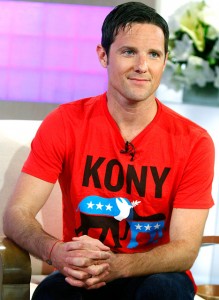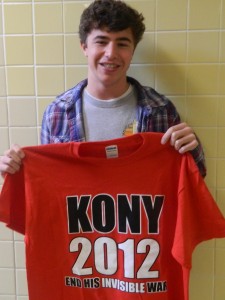
By Connor Hughes and Jake Shiner –
The Kony 2012 movement was created to help African children, specifically Ugandans, who were under Joesph Kony’s wrath.
Now, with new reports that Kony is no longer in Uganda, and the founders of The Invisible Children being a part of acts that are hardly charitable, people are starting to become skeptical.
“I don’t think the money is being used for what they say it is,” said Penn Manor senior Zane Krieder.
That type of concern has prompted a Penn Manor class to switch the benefactor of their fund raising efforts.
Through social media and other modern ways, The Kony 2012 movement has gained rapid popularity. The “Kony 2012” video was viewed over 50 million times in the first five days it was on YouTube.
Although, many people have doubts about the entire movement.
Where’s the money going? How much is Jason Russell (founder of The Invisible Children and creator of the “Kony 2012” video) profiting? Is Jason Russell a reliable character?
These questions are now being asked after recent reports about Russell.
On March 15, Russell was detained by San Diego police and taken to a local hospital after allegedly vandalizing cars, making sexual gestures, and indecently exposing himself.

This may not determine how effective the Kony 2012 fundraiser is, but it may give donors a grasp on the type of people that are running this organization.
Two weeks after Russell’s apparent breakdown and detainment, The San Diego charity behind the Kony 2012 video was making news once again, for the wrong reasons.
An executive of The Invisible Children has been filmed talking about keeping $900,000 of a charity award for himself.
The celebrity website TMZ released a 52-second video Tuesday showing Jedidiah Jenkins, Invisible Children executive, drinking from a vodka bottle, slurring his words and bragging about keeping most of a $1 million charity award for himself.
“I don’t know if you heard this or not but we won a, we won a million dollars, so … That’s pretty rad,” says Jenkins, the Invisible Children director of ideology. “Here’s $100,000 for Haiti and $900,000 extra for me. Get on the bandwagon.”
Jenkins claims the video was a joke, sent to a co-worker who was out of town to inform them of the new grant they received. Whether that claim is true or not, the video left a bad taste in many Kony 2012 support’s mouths.
Because of this and other questions regarding how much of the donation to the Invisible Children money really goes to helping Africans, Penn Manor’s entrepreneurship class isn’t going through The Invisible Children foundation to provide money to Uganda.
“They decided not to go through Invisible Children… because students want (the money) to go straight to Ugandan children,” said entrepreneurship teacher Christa Craig.

Craig says that the students realized there were concerns with the reliability of Invisible Children and this prompted them to use Red Cross as their conduit. Also, the students aren’t just worried about the amount of money donated, but the message.
“They’re looking at awareness,” said Craig.
Suspicion of the classes’ motives also have been growing throughout the school. The disclaimer that $3 dollars will be donated to the Red Cross from each shirt has spawned skepticism in some students.
“$3? Isn’t the shirt $15? They must be profiting a lot,” said Penn Manor sophmore Kasey Burkhart.
However, they shouldn’t worry. Craig informed Penn Points that part of the profit has to go into paying back investors in the project, such as Penn Manor business manager Mr. Johnston who loaned the group start up money.
According to Craig the group “Ordered 300 shirts” to sell during school lunches.
“We’d like to sell all 300 t-shirts, that’s the ultimate goal,” said Craig.
The goal remains the same; help African children. It just depends how you want to go about it. Craig’s students think the Red Cross is more reliable, and you can’t blame them.